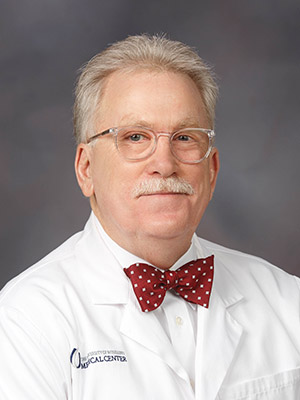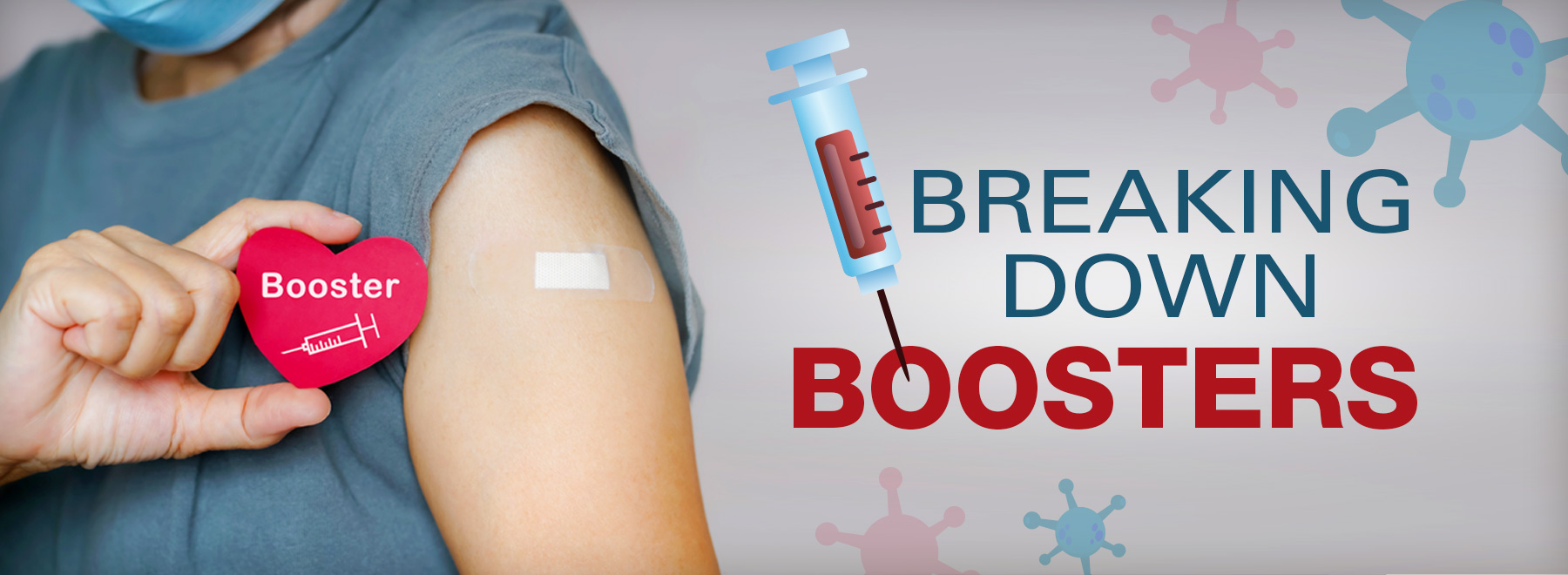Extra dose of vaccine protects against COVID-19 complications
With the COVID-19 Omicron variant raging across Mississippi, it’s as important as ever to protect yourself and those around you.
If you’re already fully vaccinated against COVID-19, University of Mississippi Medical Center doctors say a third dose – a booster shot – will help keep severe disease away. Below, UMMC boosts your knowledge:
Let’s start at the beginning. How does my immune system work and respond to vaccines?

“When the immune system sees a pathogen for the first time, the body is activated to mount a response until that pathogen is eliminated,” said Dr. Gailen Marshall, R. Faser Triplett Chair of Allergy and Immunology at UMMC. The immune system makes different kinds of antibodies that can recognize and incapacitate the virus.
In contrast, “Vaccines fool the immune system into thinking your body has been infected with the virus,” he said, so the body also makes antibodies in response.
The difference is that vaccines, like those that prevent COVID-19, don’t make you ill. You may experience side effects like soreness, chills or fever, but that’s due to your body’s immune response triggered by the vaccine, not a virus infecting and replicating inside your body.
So, one exposure to a virus or one dose of a vaccine and I’m protected forever?
No. Just like the state capitals you learned in middle school, your body does not remember everything it has encountered. That is where booster shots come in.
“Your memory of that initial experience wanes over time,” Marshall said. “Booster shots stimulate that immune memory even further.”
When you receive a booster, “the body remembers what it saw before. It has an immune memory and kicks up a response more vigorously and sooner than it did at the first exposure,” he said. Your body has a similar response if it is re-infected with a virus, but again, a booster vaccine does not carry the risks of hospitalization and death associated with SARS-CoV-2.
Boosters are a common practice. Childhood vaccinations against pneumococcus, polio and Haemophilus influenzae occur over multiple doses and years to build long-lasting protection. Adults should receive a tetanus booster every ten years to keep their defenses strong.
The COVID-19 vaccines made by Pfizer-BioNtech and Moderna work best in a two-dose sequence given about three weeks apart, while the Johnson and Johnson is a one-dose vaccine. Their clinical trials showed they create a strong immune response for several months for most people. After that, they become less effective.
“As people get further from their initial vaccinations, cases, hospitalizations and deaths go up,” Marshall said.
I’m fully vaccinated and have had COVID-19. Should I get a booster shot?
Yes. Booster shots provide more practice fighting off an infection. With the highly infectious Omicron variant spreading, a booster will lessen the chance that you become ill.
“Immunity is tied to how often you see the threat. If you never see the enemy, the body stops building defenses,” Marshall said.
OK, I want a booster. When should I get one? Does it matter which kind?
The Centers for Disease Control and Prevention recommends that people get a third dose of the Pfizer or Moderna vaccines at least five months after their second shot in the two-dose series. For people who received the Johnson and Johnson vaccine, they recommend a second dose at least two months after the first.
All people aged 18 and older can receive the Pfizer, Moderna or Johnson and Johnson vaccine boosters Youth age 12-17 can receive the Pfizer booster only.
Adults can receive any of the three vaccines as a booster, no matter which you received first.
If I haven’t had the booster, am I considered fully vaccinated?

Yes. According to Dr. Bhagyashri Navalkele, UMMC’s medical director of infection prevention, and Dr. Jason Parham, professor and chief of the Department of Medicine’s Division of Infectious Diseases, the CDC continues to define fully vaccinated individuals as an eligible person who has completed the two-dose series of mRNA vaccine or single dose of Johnson and John vaccine to be fully vaccinated.
You are considered up-to-date with vaccination if you are fully vaccinated and have received a booster shot.
I’m boosted. Will I need a fourth dose in the future?
Doctors and researchers in Israel are now testing how well a second booster works Marshall says it is too early to know how beneficial it will be in preventing further spread, but it is still an important study to conduct.
While it’s hypothetically possible to give vaccines too frequently, Marshall says the available COVID-19 vaccines are safe and there’s no evidence to suggest we’re approaching an unsafe number of doses.
“The current vaccine schedule is efficacious, and [a rise in] breakthrough infections should dictate when another booster might be needed,” Marshall said.
How does the booster perform against different variants?
“The nature of a pathogen is that it changes over time,” Marshall said. Thankfully, “It appears there’s enough cross-reactivity” what the current vaccine and booster regimen provides good protection against Delta, Omicron and other variants.
“These COVID-19 vaccines were designed based on wild-type SARS-CoV-2,” Marshall said, meaning the original virus that emerged in late 2019. “The important parts of the virus [the spike protein] are staying similar enough that the vaccines are still protective.”
Where can I get a COVID-19 vaccine or booster?
You can use MSDH website or the federal government website to find a pharmacy, clinic or health department site giving vaccines near you. All doses of COVID-19 vaccines are free to the recipient.
The above article appears in CONSULT, UMMC’s monthly e-newsletter sharing news about cutting-edge clinical and health science education advances and innovative biomedical research at the Medical Center and giving you tips and suggestions on how you and the people you love can live a healthier life. Click here and enter your email address to receive CONSULT free of charge. You may cancel at any time.



